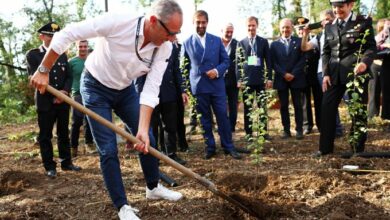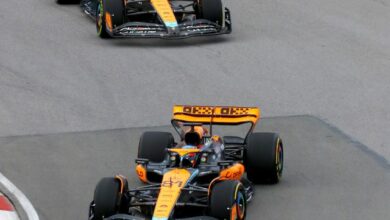Red Bull – Ford Partnership: Revolutionizing Formula 1 with 2026 Powertrains
Christian Horner's Update and the Path to Self-Sufficiency
Red Bull’s journey toward becoming a self-sufficient powerhouse in the Formula 1 world has reached an exciting juncture. Team Principal Christian Horner recently shed light on the progress and developments in the Red Bull – Ford powertrains partnership for their 2026 car, and the Formula 1 community is buzzing with anticipation.
In Horner’s own words, “so much has happened” behind the scenes, hinting at the sheer dedication and hard work that has gone into this groundbreaking venture. With Red Bull clinching both championships this year, their focus is now set not just on 2024 but also extends to the game-changing 2026 season.
Disclosing a few particulars, Horner shared with Motor Sport Magazine:
“So much has happened in the background, especially with Red Bull Powertrains.
“They have achieved some milestones during the year. And let’s not forget that 2026 is not that far away and there is a huge challenge ahead of us. Of course, that will take up a lot of time when I get back to the factory.”
As it stands, Red Bull currently relies on power units crafted by Honda, a partnership set to endure until 2025. Beyond that, a new chapter unfolds as Red Bull prepares to embark on a journey of developing and producing its own power units. The stage for this transformative endeavor is the state-of-the-art Red Bull Powertrains facility nestled in the heart of Milton Keynes.
The significance of this milestone cannot be overstated. It not only represents a pivotal moment for the Austrian racing team but also poses a unique challenge for Ford, the American automotive giant. Red Bull’s quest for independence has led to a strategic partnership with Ford, with both entities united by a common goal: to ensure that Red Bull Racing and its sister team AlphaTauri have competitive engines from 2026 onwards, in harmony with the new regulations that will be ushered in.
On the flip side, inquiries emerged regarding the depth of Ford’s engagement in the development process alongside Red Bull, raising questions about whether it was predominantly a branding-oriented initiative. Nevertheless, in an effort to dispel any doubts surrounding the partnership, Horner underscored the remarkable synergy between his team and Ford, emphasizing:
“The collaboration with Ford is excellent.
“We had Bill Ford with us last weekend [referring to Las Vegas GP]
“Jim Farley [Ford CEO] is a big supporter of the project and he was at the factory earlier that week to check on progress. It’s great to see that commitment and enthusiasm. That a brand and an OEM like Ford is involved is an extra step for us.”
The world got wind of Red Bull’s collaboration with Ford earlier this year in the vibrant streets of New York. At that juncture, even Honda, despite its status as registered engine suppliers with the FIA, had yet to determine which Formula 1 team they would supply with the new power units, come 2026. The excitement in the air was palpable, with the promise of innovation and competition.
As the motorsport world eagerly awaits the 2026 season, Red Bull and Ford are gearing up for a thrilling partnership that could potentially reshape Formula 1 as we know it. The journey is just beginning, and the road ahead is filled with challenges, triumphs, and the promise of groundbreaking engineering marvels.


